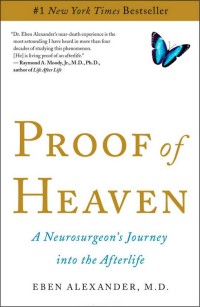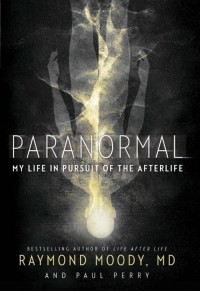Proof of Heaven: A Neurosurgeon’s Journey into the Afterlife.
By Dr Eben Alexander, M.D. published by Simon and Schuster 2012. Buy this Book!
While this book is an account of Dr Eben Alexander surviving a serious life-threatening illness, it is also a revelation of human consciousness. In the book, we find an account of a neurosurgeon’s experience of the kind of disease he himself has treated during his career. This places him in a most advantageous position to explore why he survived such a fatal illness.
Chapter by chapter the book swings between the family’s account of their experience, and what the doctor was experiencing (as far as he can remember). His account of seeing things and knowing things while out of his body is extraordinary. Whether the things he saw and heard have meaning for us is another matter. Experiencing God or heaven, is a very personal matter. Therefore, Dr Alexander’s experience may fall into the category of phenomena for us. This need not detract from the valuable information contained in this book.
What interests me most is the way this scientist was able to understand consciousness. We would expect a specialist brain doctor to understand the brain. Dr Alexander’s experience showed him that he had little understanding of the brain in relation to consciousness prior to his illness.
He says, “The brain itself doesn’t produce consciousness.” Dr Alexander explains that the brain actually filters our perceptions so that we can manage them. Then he says something that in my experience is a fact, “True thought is pre-physical.” In my own book, which examines human consciousness, (published in 2007) I say, “Our consciousness is expressed using our physical body, primarily our brain. Hippocrates observed that the brain was the messenger of consciousness, not the consciousness itself. So our brain is a tool through which we express our consciousness. The livelier our consciousness is the better its vehicle.” Kristina Kaine, “I Connecting: The Soul’s Quest” These ideas about consciousness come some way towards helping us to experience ourselves as beings of body, soul and spirit.
Dr Alexander’s experience of the will is also extremely interesting. “We are free beings hemmed all around by an environment conspiring to make us feel that we’re not free.” In my understanding, we are at a point in the evolution of humanity where we must work on our will with conscious awareness. Understanding freewill and individuation has reached a critical point in the world today. We hear cries for freedom everywhere. In fact, sometimes it seems that people who are already free are crying for even more freedom. To my way of thinking they are crying for something more and it could be the freedom that Dr Alexander experienced when we was in a coma and near death.
So Dr Alexander’s experience recorded in his book is timely. His conclusions in Chapter Fifteen are inspiring. For a neurosurgeon to write the words, “The brain itself doesn’t produce consciousness.” is quite breathtaking. Dr Alexander explains that the brain actually filters our perceptions so that we can manage them. If we think about this it really makes sense. In this multi-tasking world, we are continually filtering the information that comes towards us so that can manage our daily life. The same could easily be true of information about the spiritual worlds.
This book left me with one hope. Why can’t we be open to ideas that challenge our knowledge instead of dismissing them? Being open to possibilities is the only way to come to the truth. The truth always hides from limited minds. As Dr Alexander says of people who think that they know, “They believe they know the truth without needing to look at the facts.”
It is clear to me that Dr Alexander experienced the human spirit as something different from the human physical body. This is an awareness that I continually strive for. He observes that, “Much of what people have had to say about God and a higher spiritual world has involved bringing them down to our level, rather than elevating our perceptions up theirs.” I applaud Dr Alexander for producing this book; it has given me hope that as a human race we will increasingly experience the truth that we are spiritual beings inhabiting a physical body. – Review by Kristina Kaine.

